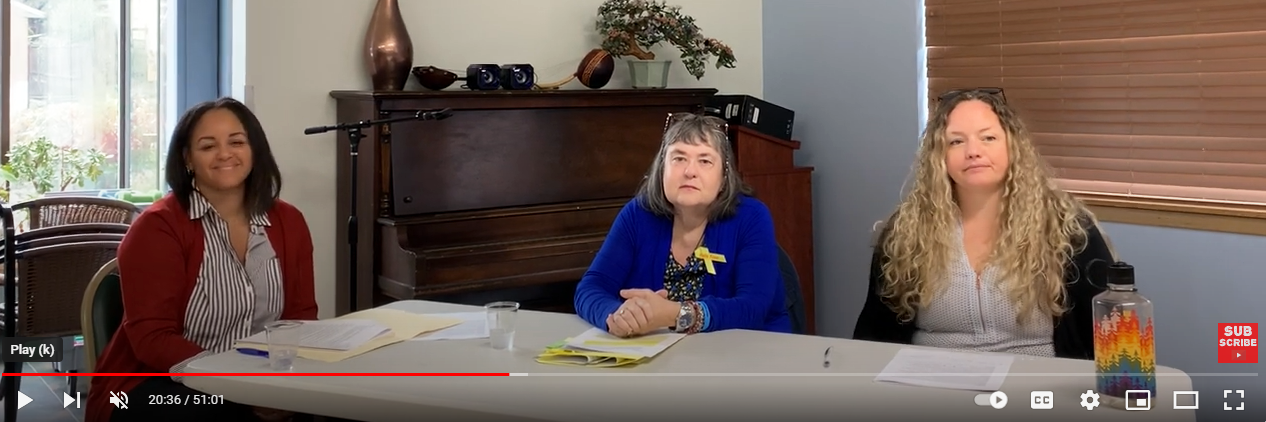Civic Coffee Recap: Falls Prevention

On September 26, 2023, Age Friendly Seattle hosted its monthly Civic Coffee in collaboration with the Southeast Seattle Senior Center. Panelists Paige Denison and Deidre Daymon (Director and Assistant Director of Health Wellness & Project Enhance at Sound Generations, respectively); Mary Pat O’Leary, RN (a senior planner at Aging and Disability Services, Seattle Human Services Department); and Kelsey Schultz, OT (International Community Health Services) discussed falls prevention.

Kelsey Shultz (left), Mary Pat O’Leary (back), and Deidre Daymon (right) pose with a participant at the September 2023 Civic Coffee
In a presentation by Sound Generations and the King County Falls Prevention Coalition, Paige said that falls are a major health issue for many older adults, which makes it even more critical for them to create a “falls free” plan. In 2021, 60 percent of fall-related deaths among Washington state residents aged 65+ resulted from falls in their homes. This signifies the importance of making small adjustments in our homes to reduce the risk of falls.
Paige mentioned that a fear of falling increases future falls risk. Fear may cause a person to be less active, even though they are still capable of activity. Physical activity is vital to older adults’ mental and emotional wellbeing. Inactivity causes legs to weaken. When a person remains seated for extended periods of time, their muscles weaken. This leads to a loss of balance and coordination.
Most falls result from multiple risk factors—physical and behavioral changes can increase our fall risk, as can environmental hazards in our homes and communities.
In her presentation, Paige shared six steps to create your falls free plan:
- Find a good balance and exercise program that allows you to be as physically active as your body allows you to be.
- Talk to your healthcare provider about falls because common medical conditions can increase the risk of falls.
- Review your medications with your healthcare provider or pharmacist to be aware of possible side effects.
- Get hearing and vision checkups because changes can contribute to increased falls risk.
- Keep your home safe—make sure that your environment is clear of any potential hazards that can cause a fall.
- Talk to your friends or family members for support.
Panelists share several programs that can help older adults stay active and healthy as they age:
- Tai Ji Quan: Moving for Better Balance—Kelsey highlighted International Community Health Services’ Tai Ji Quan program, which offers virtual and in-person classes to anyone in King County aged 55 or older. This program teaches participants eight simple Tai Ji Quan forms that are used to introduce balance exercises. The balance exercises help participants strengthen their knees, ankles, and hips while learning to implement these balance exercises into their everyday lives. Mary Pat added that Tai Ji Quan is gentle and purposeful movement that helps both the body and mind.
- Enhance Fitness and A Matter of Balance—Sound Generations offers two programs that promote exercise and balance for older adults. Enhance Fitness classes are proven to improve physical function, decrease depression, and protect against falls and fall injury. Another program, A Matter of Balance, helps empower older adults to live confident and independent lives by teaching practical strategies to reduce the fear of falling and increase activity. These programs are offered throughout senior and community centers throughout King County.
Panelists encouraged the use of a Personal Emergency Response System (PERS, sometimes called medical alert systems) by older adults at risk of falling; however, Mary Pat emphasized that older adults should not rely on the pendant to solve their falling problem.
If one experiences frequent falls, it is important that they take a falls assessment to find the reason for the falls and possible ways to help reduce their occurrence. King County’s One Step Ahead Fall Prevention Program provides a free in-home or virtual visit by a fall prevention health educator, who can walk through your home to identify potential fall hazards.
Falls prevention is a personal topic—unique for every individual. All panelists mentioned the importance of talking to a health care provider. Assistive devices like canes, walkers, and personal emergency response systems should be curated to best fit individual needs and safety. Taking note of medications and potential side effects is also important. Your healthcare provider can tell you how these may contribute to fall risk.
Couldn’t attend the Age Friendly Seattle Civic Coffee on falls prevention? Watch the video recording on YouTube (click on the image at the top of this page).
We encourage older adults and individuals interested in accessibility to join Civic Coffee: Aging, Technology and Accessibility on Thursday, November 16 (10:30–11:30 a.m.) at the Washington Talking Book & Braille Library (2021 9th Ave, Seattle, WA 98121). This will be an in-person event with options to join online.
Age Friendly Seattle Civic Coffees are scheduled monthly. Stay connected with Age Friendly Seattle by visiting the events webpage and Aging King County’s Age Friendly Live—Virtual Events webpage. Also, follow Age Friendly Seattle on Facebook and Twitter. For more information, e-mail agefriendly@seattle.gov.
 Contributor Fathima Garcia is an intern with Age Friendly Seattle. She is a recent Seattle Central College graduate with an associate degree in business administration. Starting this fall, she will study Human Resources Management at the University of Washington Foster School of Business.
Contributor Fathima Garcia is an intern with Age Friendly Seattle. She is a recent Seattle Central College graduate with an associate degree in business administration. Starting this fall, she will study Human Resources Management at the University of Washington Foster School of Business.
The photo at top was taken at the September 2023 Age Friendly Seattle Civic Coffee at the Southeast Seattle Senior Center.
This article appeared in the November 2023 issue of AgeWise King County.
![Aging & Disability Services for Seattle & King County [logo]](https://www.agingkingcounty.org/wp-content/themes/sads/images/seattle-ads-logo.png)